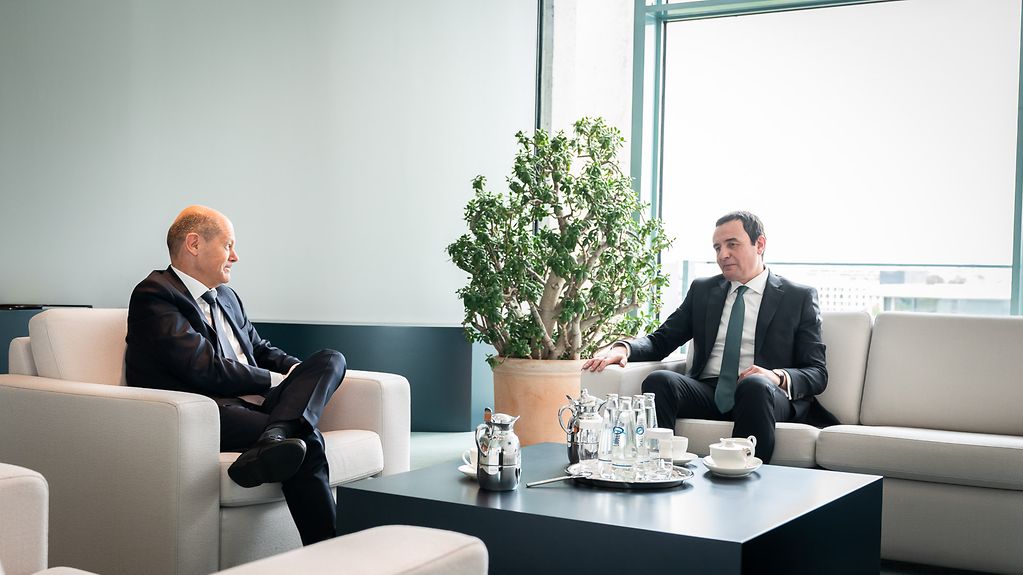Scholz meets Prime Minister of Kosovo
Russia’s invasion of Ukraine and the economic situation in the Western Balkans were at the top of the agenda for the talks between Federal Chancellor Olaf Scholz and Prime Minister Albin Kurti of Kosovo.
3 min reading time

Talks in the Chancellery: Federal Chancellor Scholz received Prime Minister Albin Kurti in Berlin.
Photo: Federal Government/Kugler
“Germany and Kosovo are closely linked, not least through the over 400,000 citizens in Germany who have Kosovan roots,” said Federal Chancellor Olaf Scholz following his talks with the Kosovan Prime Minister Albin Kurti. Scholz also stressed the close economic ties between the two countries, as Germany is the largest bilateral investor in Kosovo.
Scholz praises Kosovo’s response to Russian invasion
“As a country whose recent history is still marked by war, Kosovo joined all international forums at an early stage, with clarity and in alignment with the positions, and it is doing its part with sanctions,” said Scholz with regard to the international response to Russia’s invasion of Ukraine. “That is worthy of great recognition,” the Federal Chancellor said.
On the issue of EU membership prospects, Scholz went on: “The Western Balkans are part of Europe and all these countries must in future be a part of the European Union.” He stressed that this of course includes Kosovo, and that Prime Minister Kurti had updated him on progress with reforms in Kosovo.
Scholz emphasised that major issues in attaining EU membership were fighting corruption and strengthening the rule of law which the Kosovan government had prioritised for its work. “You can't make progress on these issues overnight,” Scholz said. “But they are critical to opening up prospects and opportunities for people and young persons in particular in the country.”
Bilateral relationship between Kosovo and Serbia
Following his meeting with his Kosovan counterpart, Scholz received President Aleksandar Vučić of Serbia in the Chancellery. Both sets of talks also helped support the EU-led dialogue between Kosovo and Serbia. On the issue of the bilateral relationship, Scholz stressed that “progress in the dialogue is of huge significance, both in terms of guaranteeing lasting peace and stability in south-eastern Europe, and also with regard to EU integration for both countries.”
The Federal Chancellor called on the two states to resolve issues through dialogue. “This takes courage and determination. All commitments must be fulfilled. Unilateral actions and polemic rhetoric are not helpful.” He expressed his conviction that “especially in times like these, in which a brutal war is taking place on our very doorstep, it is of vital importance that the two countries gradually resolve their conflict.”
To encourage further progress of this dialogue, the Federal Chancellor had also invited the EU Special Representative Miroslav Lajčák to Berlin. He met Vučić and Kurti at the Federal Foreign Office’s guest house Villa Borsig in the evening. The goal of the Brussels Dialogue is a comprehensive, sustainable agreement between the two countries that opens up EU membership prospects for both countries and contributes to regional stability.
The Republic of Kosovo is recognised by more than 110 states around the world, including Germany. Serbia is among the countries that have not recognised Kosovo. Kosovo’s convergence with the EU and the NATO is hindered by its unresolved relationship to Serbia. Since 2011, the EU has been facilitating a political dialogue which has allowed for important agreements to be reached. Following an interruption, the dialogue was resumed by the EU Special Representative in July 2020.